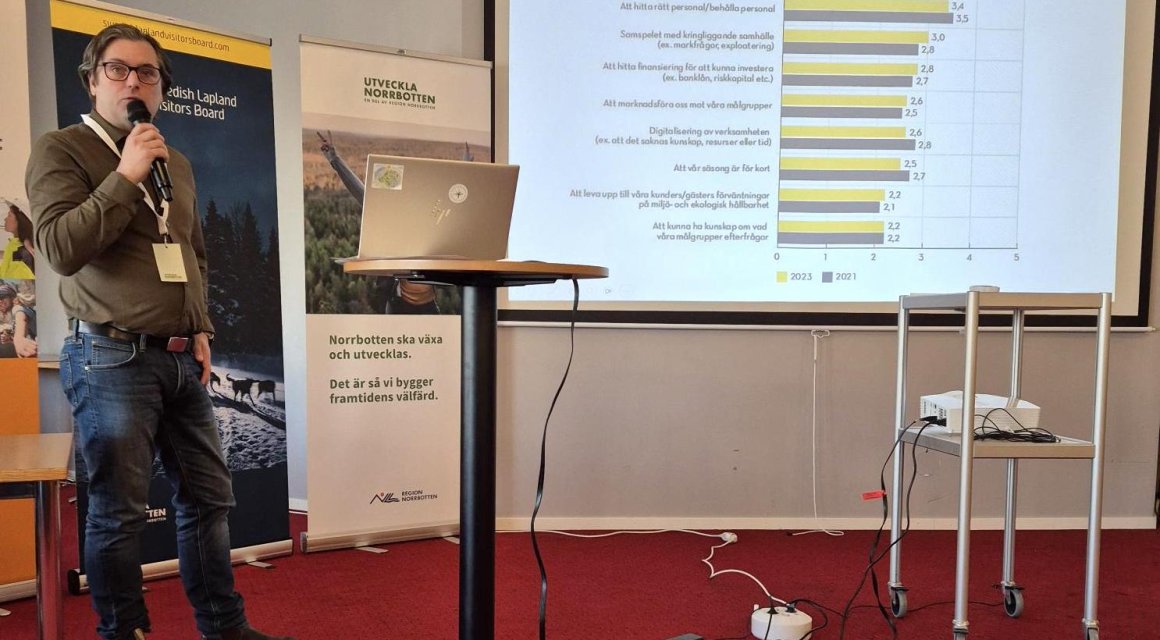
Hospitality industry perspectives fed into new OECD report
At the seminar “Building smart, reslilient communities: adapting sparsely populated areas to a digital & green future” led by Mikael Janson, Director of the North Sweden European Office together with the moderator Stefano Barbieri, OECD Rural and Regional Policy Expert, the Swedish Lapland Visitors Board contributed to a joint SWOT analysis as input to the process of updating the OECD report for Sweden, Norway and Finland’s northernmost counties.

In his opening speech, Mikael Janson welcomed all participants’ input to the process and set the scene for further discussion on how we continue to build smart, resilient communities in our sparsely populated areas:
“Europe is a continent of diversity. We in Arctic Europe are proof of that. Being at the forefront in many areas, but lacking capacity in many others will be our focus today. Due to our regions’ remoteness, vastness and harsh climate, we need support to unlock our full potential. Our regions are made up of a myriad of small and medium-sized cities. And in between, it is not empty. Quite the contrary. Rather, it is an actual regional ecosystem for innovation at different scales to continue to develop and support. This is how competitive value chains are formed, which in turn attract resources”.
A number of years ago, the OECD produced a report on the 14 regions of the NSPAs (North Sparsely Populated Areas), and now it is time for an update, done in cooperation with the European Commission’s Directorate-General for Reform.
Panelists Andrew Rae, Professor at the University of Highland and Islands, Scotland, Rickard Carstedt, Regional Councillor Västerbotten, Goeril Johanssen, CEO ProTromsø, Norway and Jussi Rämet, Municipal Councillor Oulu, Finland shared their perspectives and experiences and discussed how these sparsely populated regions, rich in natural resources and innovation, face challenges such as negative population growth and skills shortages, conflicts of interest, the need for stakeholder engagement, the shift of carbon-intensive industries to fossil-free, and retaining and developing talent.

In the SWOT analysis, the meeting participants jointly identified strengths, weaknesses, opportunities and threats, and provided concrete input on what we need to do together in the next steps.
“We look forward to the OECD report and we look forward to continuing the dialog. But most of all, we look forward to continuing to work together because that’s when things happen,” concludes Mikael Janson.
The North Sweden European Office is one of three Brussels offices representing the Northern Sparsely Populated Areas (NSPA) network.
The Northern Sparsely Populated Area ( NSPA ) network represents close cooperation between Sweden’s four northernmost counties (Norrbotten, Västerbotten, Jämtland Härjedalen, Västernorrland), Finland’s seven northernmost and easternmost regions (Lapland, Northern Ostrobothnia, Central Ostrobothnia, Kainuu, North Karelia, Pojois-Savolax and South Savo) and Northern Norway (Finnmark, Troms and Nordland). These 13 regions from three countries share common premises and objectives and are working together to raise awareness of NSPAs in the EU institutions, to influence EU policies and to create a platform for sharing experiences and knowledge.
The Organization for Economic Co-operation and Development (OECD ) is a forum and knowledge hub for data, analysis and best practices in public policy. It involves over 100 countries and helps shape better policies for better lives.





 Svenska
Svenska  English
English 

